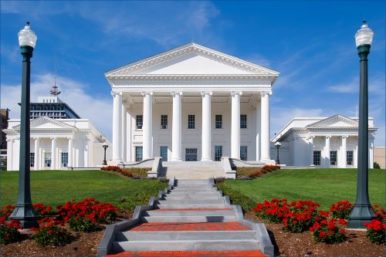Youngkin announces plan for millions in early childhood and child care spending
by Virginia Mercury
With the last pandemic-era expansions of federal child care aid to states set to end next year, Gov. Glenn Youngkin is proposing to put $448 million into the commonwealth’s early learning and child care system in each of the next two years.
“The reality is that in March 2024, without significant reforms to improve this long-term viability of our child care programs, we would otherwise see children simply being kicked out of these most important collaborations that enable families to realize their dreams and so we can’t leave families, parents and their children without options,” said Youngkin at a press conference for his “Building Blocks for Virginia Families” initiative Thursday.
The funding will be part of Youngkin’s proposal for the state budget over the next two years, which he is scheduled to present to lawmakers Dec. 20. The General Assembly, which Democrats will narrowly control when the session begins this January, will use that proposal as the jumping-off point for their own spending plan.
While the administration has not yet provided a detailed breakdown of how all of the $448 million would be spent, a document provided to reporters includes a list of priorities. They include the desire to “ensure every low-income working family that currently receives public support continues to have access to early childhood and afterschool programs,” “accelerate parent choice, from home-care providers and public school preschools to community co-ops and private day centers,” and require all early childhood programs to “annually measure and report unmet parental demand and preference.”
A few priorities have dollar figures attached: The proposed investment includes $25 million to develop public-private partnerships in areas with child care shortages, $10 million in educator incentives and $1 million to launch early learning and child care accounts on a digital wallet platform for families with children under five. Families can use the wallets to accept funds from such groups as employers, local governments and family members.
Additionally, the plan calls for streamlining teacher licensure requirements and “rightsizing” student-teacher ratios.
“This is about an opportunity for success,” Youngkin said, “and it starts with success for families.”
Kathy Glazer, president of the Virginia Early Childhood Foundation, called the proposal “a remarkable commitment to Virginia’s children and families.”
“By sustaining access to quality, affordable early childhood care and education services, these investments will help unlock the potential of all children and keep Virginia on the path to economic success,” she said in a statement.
An October report by Virginia’s Joint Legislative Audit and Review Commission found approximately 1.1 million children in Virginia aged 12 and younger need child care, and the majority of Virginia families find care to be unaffordable.
The situation is set to worsen. Over the past three years, Virginia has used federal relief funds to help meet child care demand. However, the commonwealth is in jeopardy of being unable to support services when American Rescue Plan Act child care funds expire at the end of the federal fiscal year 2024. JLARC has estimated that 25,000 Virginia children could lose their child care slots as a result of the end of pandemic child care subsidies.
As other pandemic relief programs wind down, legislative staffers have told lawmakers that signs are increasingly pointing to the U.S. entering a slowdown or mild recession next year as high revenues over the past few years begin running dry.
The governor has asked state agencies to begin looking at cuts for the July 1, 2024 to June 30, 2026 budget, the Richmond Times-Dispatch has reported.
Child care advocacy groups on Thursday said they hope lawmakers will see the need to keep parents and providers afloat with stable funding and investments. Allison Gilbreath, senior director of policy and programs for Voices for Virginia’s Children, said the proposed investments are “desperately needed.”
“As a mom, my career begins and ends with access to early childhood that is affordable and accessible for my family,” she said. “So it’s going to be so meaningful for families across the commonwealth.”
Virginia Mercury is part of States Newsroom, a network of news bureaus supported by grants and a coalition of donors as a 501c(3) public charity. Virginia Mercury maintains editorial independence. Contact Editor Sarah Vogelsong for questions: info@virginiamercury.com. Follow Virginia Mercury on Facebook and Twitter.



